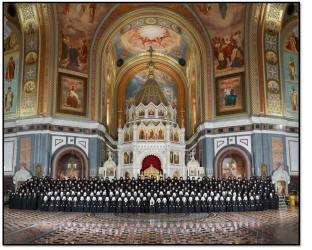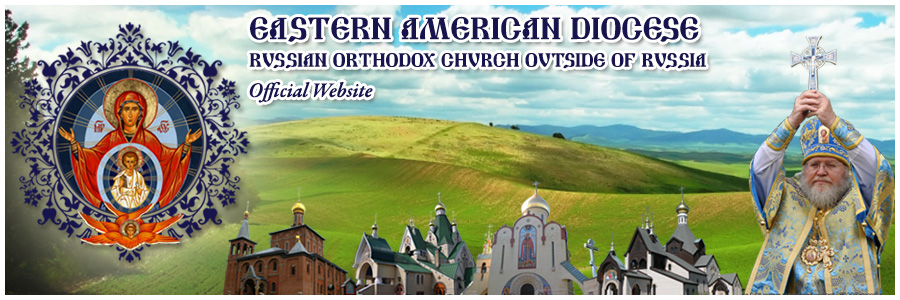February 5, 2013
Moscow: Epistle of the Holy Council of Bishops to the
Clergy, Monastics, Laity, and Spiritual Children of the Russian
Orthodox Church
Beloved in the Lord Reverend Father Presbyters, Honorable Deacons,
God-loving Monks and Nuns,
Dear Brothers and Sisters, Faithful Children of the Russian Orthodox
Church!
 The
Holy Council of Bishops, convening in Christ the Savior Cathedral in
Moscow on February 2-5, 2013, appeals to all its flock with the
words of Apostolic greeting: “Grace unto you, and peace, from God
our Father and the Lord Jesus Christ. We are bound to thank God
always for you, brethren, as it is meet, because that your faith
groweth exceedingly, and the charity of every one of you all toward
each other aboundeth” (ІІ
Thessalonians 1:2-3).
The
Holy Council of Bishops, convening in Christ the Savior Cathedral in
Moscow on February 2-5, 2013, appeals to all its flock with the
words of Apostolic greeting: “Grace unto you, and peace, from God
our Father and the Lord Jesus Christ. We are bound to thank God
always for you, brethren, as it is meet, because that your faith
groweth exceedingly, and the charity of every one of you all toward
each other aboundeth” (ІІ
Thessalonians 1:2-3).
The main task of the Church is the salvation of man. Everything that
occurs in the life of our Church and the relationship between the
Church and society and the state should be subjected to this goal.
Our missionary, educational, charitable, and other efforts should be
directed in the end toward the salvation of each human soul. The
command of the Savior: "Go ye therefore, and teach all nations,
baptizing them in the name of the Father, and of the Son, and of the
Holy Spirit: teaching them to observe all things whatsoever I have
commanded you" (Matthew 28:19-20), remains vital for us in our time.
Remembering this, the members of the Council of Bishops discussed
many matters in church and social life, adopting Conciliar decisions
and other documents addressed today to the Fullness of our Church.
Tending to the good order of Church life, the members of the Council
determined the future procedure for the election of the Patriarch at
the Local Council, delineated the authority of the Local Council and
Council of Bishops, approved the establishment by the Synod of
Bishops of new metropolitanates and dioceses. They also offered
potential solutions for important challenges facing society.
In particular, the Holy Council expressed the position of the Church
on developing technology and the processing of personal data.
Standing guard for human freedom, the Church calls upon the state
not to force people to accept those technologies which might hinder
them in freely confessing their faith in Christ and following it in
their personal and public lives. The consent of Christians to abide
by various legislative, political, or other ideological ordinances
must likewise depend on the latter’s compatibility with a Christian
way of life.
The Church continues to care for the strengthening of the family
unit, for protection against improper intrusion into its life, the
support of strong bonds between children and their parents, the
security of children, including protection against violence,
cruelty, and perversion. With regard to these matters, the Council
of Bishops evaluated reforms in the areas of family rights and
juvenile law being made in many countries.
The Church harbors serious concerns about the current state of the
environment. Pollution and the exhaustion of natural resources are
raising the stark question of the preservation of the many forms of
life, and the thoughtful use of nature’s gifts. Council members
elucidated the position of the Russian Orthodox Church on real
ecological issues, reminding society of its responsibility for the
preservation of God’s creation.
The pastors and flock of the Russian Orthodox Church are called upon
to carefully study the documents adopted by the Council of Bishops,
most of which were prepared over the course of three years of
discussions led by the Inter-Council Presence, with the
participation of hundreds of bishops, clergymen, monastics, and
laymen.
Our Lord and God Jesus Christ warned His disciples: "If ye were of
the world, the world would love his own; but because ye are not of
the world, but I have chosen you out of the world, therefore the
world hateth you" (John 15:19). Since Apostolic times, the
historical path of the Church has been bound to witness, which
consists of earnestly confessing the Truth. The abuse directed
against Christians by the spirit of this world (І
Corinthians 2:12) throughout the entire history of the Church has
used various means to turn man away from his Creator and Savior.
This abuse has not only taken the form of efforts to lure people
into sin, but in outright persecutions of the followers of Christ.
But the crucible of deprivation and sufferings has only strengthened
the faith and stoked the hearts of the faithful children of the
Church. Venerable Dalmatus of Iset, canonized in 2004 as a local
Siberian saint, serves as an example of patience in suffering. His
veneration throughout the Church was confirmed by the present
Council. More than once, St. Dalmatus witnessed the destruction of
the monastery he established, but he rebuilt it every time,
staunchly defending his faith and the rules of the Church,
preserving his profound humility before his neighbors.
The events of last year have shown that Orthodoxy is enjoying a
rebirth as the foundation of national self-awareness, uniting all
healthy forces of society – those forces which strive to transform
life on a solid foundation, upon the spiritual and moral values that
entered the flesh and blood of our peoples. This is why wicked
people have chosen the Church as their victim, by means of lies,
slander, blasphemy, the destruction of churches, and the desecration
of holy things.
The Holy Council recalls that the proper response to such actions
must be prayer, preaching, and confirmation of the Truth of God,
peaceful civil demonstrations by Orthodox Christians, and an
increase in deeds of love and mercy. We must remain the light of the
world and the salt of the earth, so that people who behold our
"chaste conversation coupled with fear" may even "without the word
be won" for Christ (І
Peter 3:1-2). Defending the faith, we must always remember the words
of Christ the Savior: "By this shall all men know that ye are My
disciples, if ye have love one to another" (John 13:35).
Fulfilling our service to the Church, laboring in the Vineyard of
Christ, we are called not in word but in deed to strengthen "the
unity of the Spirit in the bond of peace” (Ephesians 4:3),
conciliarly, together: archpastors, clergymen, monastics, and laity.
Mainly, we must strive to guide our lives according to the Gospel.
This is the sole path to the transfiguration of each person and of
all of society.
May our Lord Jesus Christ, Chief of eternal life, strengthen us and
give us wisdom in the tasks that lie ahead.
Press Service of the Patriarch of
Moscow and All Russia


